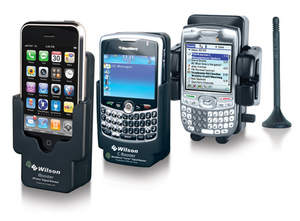Contact Information: For press only contact: Gina Baldazzi 435.986.6213 http://www.wilsonelectronics.com/iBooster/
iBooster Cellular Amplifier for the iPhone and Curve Is Now Shipping From Wilson Electronics
An Accessory for Keeping Smartphones Smart
| Source: Wilson Electronics, Inc.
ST. GEORGE, UT--(Marketwire - August 10, 2009) - Smartphones are pretty dumb when they can't
get a signal. This in mind, Wilson Electronics recently
launched a new product line called the Cradle Booster. For millions of
users, getting a strong connection for voice, email, Internet, and
3rd-party apps like navigation and maps, which don't operate at all without
"bars," is evolving from luxury to necessity. A growing trend in the use of
phones that are essentially microcomputers could be attributed to the
growth of 3G networks and cloud computing. Without a signal however, these
phones are rendered relatively useless. Wilson has sturdy cellular boosters
for any weak signal
problem, but the Cradle Booster was created as something unique for car
drivers.
Wilson's Cradle Boosters amplify weak cellular signals
and practically end dropped
calls and data dead zones. They also provide a place to recharge the
phone in its own cradle making it a perfect hands-free accessory for
Bluetooth and "on-the-phone" GPS users.
The iBooster for the
iPhone™ is a plug and play kit that is just in time for the iPhone
3GS and also fits earlier iPhones. Wilson's C-Booster model has been
developed for the BlackBerry® Curve™. "The Cradle Booster line is the
first cell signal booster on the market that is specifically designed for
these phones," said Joe Banos, COO, Wilson Electronics, Inc. He also said
that the need for these amplifiers was confirmed at the Consumer
Electronics Show 2009 where the company debuted the iBooster for iPhone
users. Many who saw them wanted to buy the iBooster right off the display
table he said.
For everybody else, this fall brings the U-Booster, a universal Cradle
Booster. So the Palm® Pre™, G1™, Treo™, or any other phone will
have great signal coverage, too.
But what affects a cellular
signal in the first place? Distance from a cell tower and obstructions
such as hills, trees and buildings all interfere with signal quality.
Likewise, the stucco and concrete used for walls and in buildings impede
cell phone reception. The actual phone design can also cause connectivity
issues as cellular phones have "built-in" antennas, which are often
covered-up by the user's hand when they talk on the phone.
About Wilson Electronics
Wilson Electronics, Inc. leads the industry as a 40-year-old pioneer in
cellular amplifiers, antennas, and related components that have made
significant improvements in cellular communications for both mobile and
in-building situations. In tests, Wilson's designs outperform their
competition in real-world applications. All Wilson products are engineered,
assembled and tested in the company's headquarters in St. George, Utah.
Wilson amplifiers fully comply with FCC regulations for cellular devices
and are FCC and Industry Canada type accepted. For more information, visit
www.wilsonelectronics.com.
